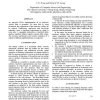Free Online Productivity Tools
i2Speak
i2Symbol
i2OCR
iTex2Img
iWeb2Print
iWeb2Shot
i2Type
iPdf2Split
iPdf2Merge
i2Bopomofo
i2Arabic
i2Style
i2Image
i2PDF
iLatex2Rtf
Sci2ools
101
click to vote
FPL
2006
Springer
2006
Springer
An FPGA-Based Electronic Cochlea with Dual Fixed-Point Arithmetic
An improved FPGA implementation of an electronic cochlea filter is presented. We show that by using decimation, the computations of the electronic cochlea can be reduced. Furthermore, employing dual fixed-point arithmetic, gives a significant improvement in signal to noise ratio. A sequential architecture is described which employs pipelined infinite impulse response filter stages. The accuracy, performance and resource utilisation of a number of different implementations are compared.
Electronic Cochlea | Electronic Cochlea Filter | FPL 2006 | Hardware | Improved Fpga Implementation |
| Added | 22 Aug 2010 |
| Updated | 22 Aug 2010 |
| Type | Conference |
| Year | 2006 |
| Where | FPL |
| Authors | C. K. Wong, Philip Heng Wai Leong |
Comments (0)

